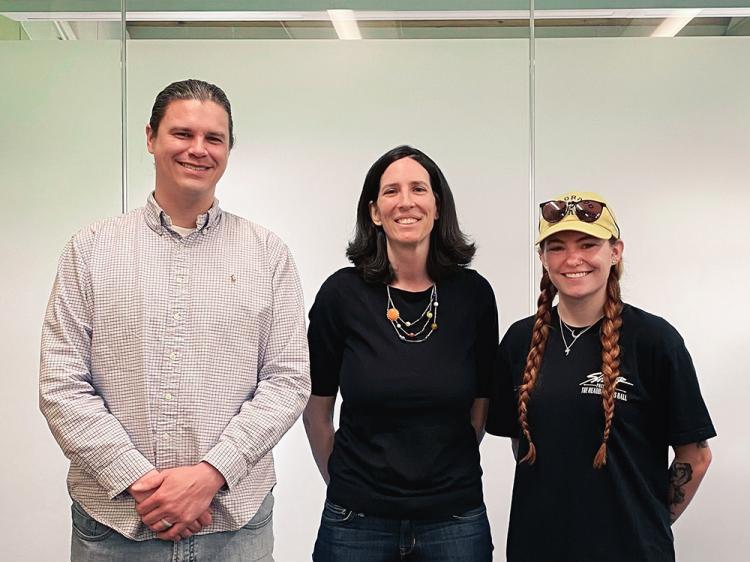Undergrads are setting their sights for the stars
New astronomy program features CU Boulder interns giving Rocky Mountain National Park visitors a tour of the night skies
Visitors at Rocky Mountain National Park this summer are in for a galactic treat, thanks to a new University of Colorado Boulder astronomy program.
Undergraduate interns will be leading telescope viewings of the night sky for the public as part of a project started by Julie Comerford, associate professor in the Department of Astrophysical and Planetary Sciences.
This project is part of a $823,230 grant Comerford won from the National Science Foundation (NSF), which will further her research into how collisions of galaxies lead to collisions of black holes, which produce ripples in spacetime called gravitational waves.

At the top of the page: Stargazing in Rocky Mountain National Park. Above: Associate professor Julie Comerford (middle) and undergraduate students Joe Zator (left) and MacKenzie Dean (right).
“One of the things I like about the NSF is that it requires research proposals to have an education or outreach component,” Comerford says. “That really elevates education and outreach as something that’s worth time and investment, and I also wanted to do something that benefited both CU undergraduates and the general public.”
Comerford says she was inspired by similar program that a colleague at the University of Utah started at Bryce Canyon National Park in Utah.
“This program resonated with me because it would’ve been my dream summer job as a college student,” Comerford says. “Now I get to live vicariously through these students who are going to have that opportunity.”
The two interns for the program’s first year are MacKenzie Dean and Joe Zator, astronomy and astrophysics majors who both already have experience teaching astronomy. Dean has taught elementary students in South Dakota, and this spring she started her own astronomy project at Collision Brewing in Longmont, Colorado, where she works part-time. Zator works at Fiske Planetarium at CU Boulder presenting shows in the big dome.
Dean says she first became interested in astronomy as a young girl “camping a lot in the middle of nowhere” with her family. “I remember a guy with a massive telescope at a campground would let us look at stars, the moon and planets,” Dean says, adding: “I’m really looking forward to the internship.”
Zator says he enjoys talking science and interacting with the public “to bring the excitement and joy of space to others. To be able to do star talks outside and teach telescope observations at the park is a dream.”
Dean and Zator will be leading views of the planets, nebulae where new stars are being born, and the Milky Way’s next-door neighbor, the Andromeda galaxy.
During a test run at the park, Comerford says she recalled one visitor who was so struck by the detail in Saturn’s rings that he checked the other end of the telescope to see if a Saturn sticker was there.
“While visitors can appreciate the beauty of the night sky with the naked eye, the appreciation deepens when they can actually make out details through a telescope and understand what they’re seeing,” says Comerford, who adds that CU Boulder has the largest number of astrophysics majors in the country.
Nils Halverson, chair of the Department of Astrophysical and Planetary Sciences, says the intern program enhances CU Boulder’s educational mission by “increasing appreciation for our universe through direct experience of the awe and wonder of the night sky, a resource which is increasingly rare due to light pollution. The internship opportunity is also much sought-after by our undergraduate majors and gives them the opportunity to share what they’ve learned in the classroom with the general public, and inspire others. It’s a win-win.”
This program resonated with me because it would’ve been my dream summer job as a college student. ... Now I get to live vicariously through these students who are going to have that opportunity.”
Danielle York, an education specialist and night sky program coordinator at Rocky Mountain National Park, says while the park has hosted night sky programs for years, the internship component is new.
“We're excited to welcome these interns to our team of park rangers, other interns and volunteers,” York says.
Comerford says she hopes the experience gives the interns “a different angle” on their major.
“Our students go on to do a wide variety of things. I hope they can use the night sky as an entry point for teaching and outreach about astrophysics.”
Zator, who hopes to do research on exoplanets (planets in other solar systems that could support life) or work in the private sector in the space industry, says to him national parks “inspire awe and show the beauty of our planet and our country. I could not think of a better way to add to that sense of wonder than to offer a guide to the night sky and foster the public's interest in exploring the cosmos. There's so much to see if we just get to a dark sky and look up.”
Dean, who plans to get her master’s degree and PhD and then teach at CU Boulder, agrees with Zator, adding, “No one has ever looked at the sky and not wondered.”

